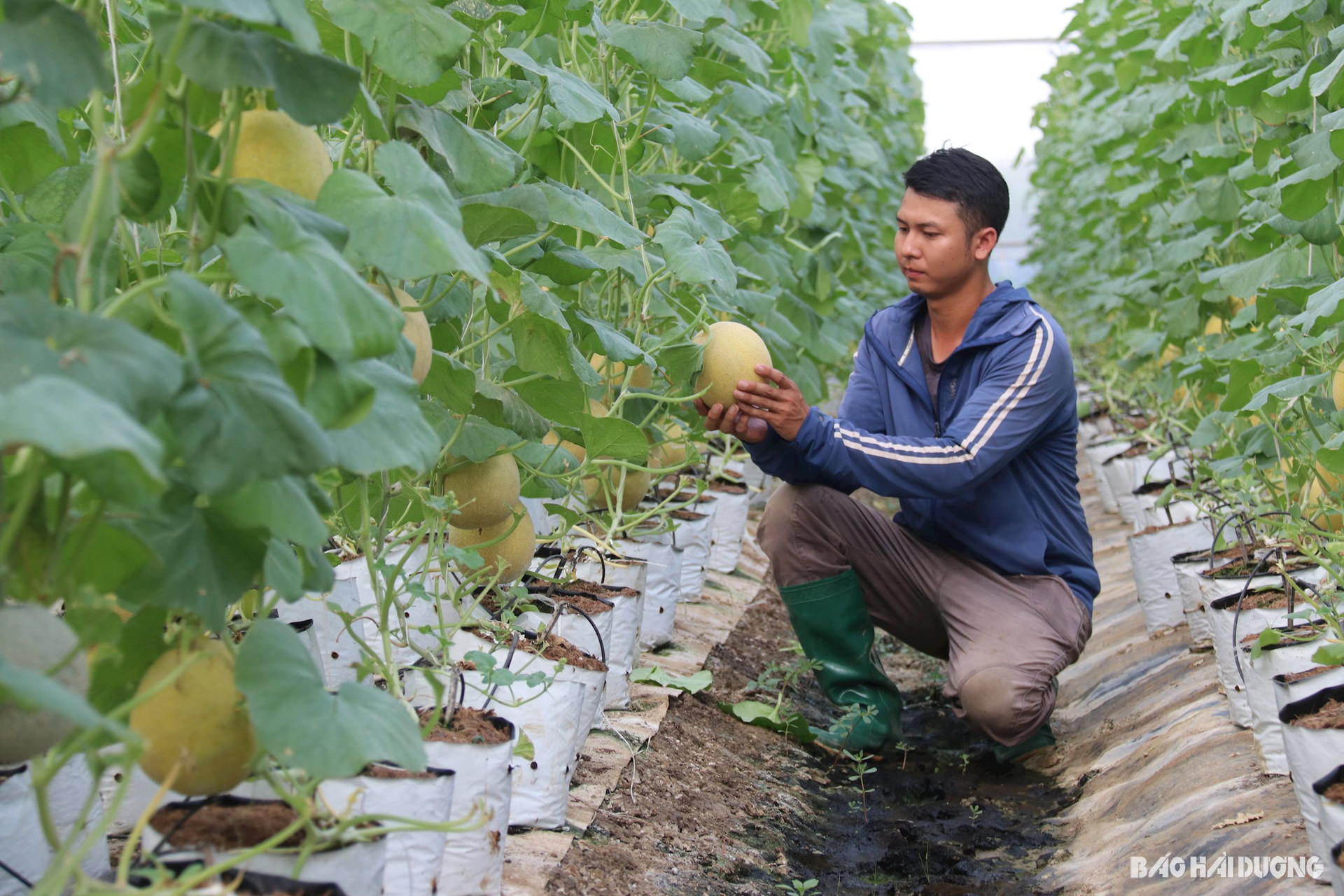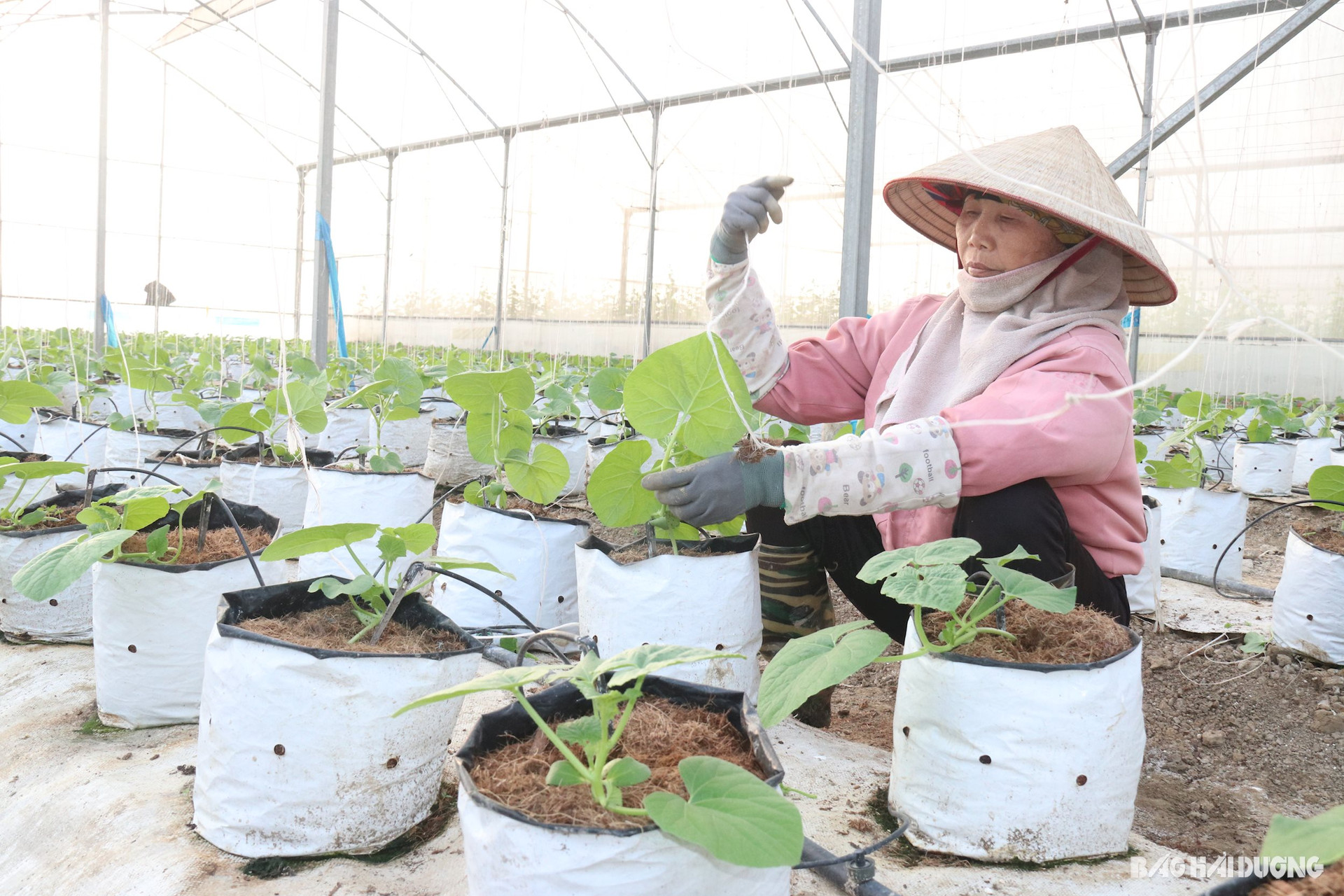Agricultural production according to the circular economic model is the highlight of Au Viet Farm Cooperative in Kim Xuyen commune (Kim Thanh, Hai Duong).

Au Viet Farm Cooperative is directed by Mr. Bui Van Duy. An accountant, because of his passion for agriculture, Mr. Bui Van Duy learned from many models and then returned to his hometown to rent fields to implement a circular economy model.
Au Viet Farm Cooperative was established in 2020, initially with 7,000 m2with 4 greenhouses. Initially, with little capital, Mr. Duy rented a few fields. As time went on, he accumulated more and more fields from local people. Currently, the cooperative has 15 greenhouses with a total area of 3 hectares. This is the largest greenhouse production area in Kim Thanh district. From March to October every year, the cooperative specializes in growing melons such as queen melons, Korean melons, and Japanese melons. From October to March, it specializes in growing bell peppers, cherry tomatoes, and cucumbers.
With the goal of green production, the cooperative has recycled and collected agricultural by-products. The entire greenhouse area uses an automatic drip irrigation system using Israeli technology, with surveillance cameras. The cooperative has a detailed plan from planting to harvesting, so it can proactively plan consumption times.
After harvesting, members of the cooperative focus on handling pesticide residues, cleaning, and isolating the garden for 20-25 days to clean up fungi, bacteria, and pathogens before entering the new crop. According to Mr. Duy, because of production in greenhouses, most agricultural products are not affected by the weather, grow stably, and are harvested on time.

According to Mr. Bui Van Duy, Director of Au Viet Farm Cooperative, in the past, many farmers after harvesting the melon crop often cleared the fields, piled the melon stems on the banks to decompose and cause odor, causing environmental pollution. Since 2022, the Cooperative has begun applying a circular economic model. That is, in the production process, nothing is wasted or discarded to extend the value chain in agriculture. After harvesting the melons, the melon stems are collected and composted to create a valuable source of nutrients for the next season, without throwing away waste. Spoiled vegetables and tubers are also composted into organic fertilizer. This helps keep the environment around the Cooperative clean. Thanks to that, the Cooperative saves more than 100 million VND each year on fertilizer purchases.
The products of the Cooperative do not use inorganic fertilizers or chemical pesticides. The unit strictly applies VietGAP process in production. Thanks to the clean production process and the circular economic model, crop productivity has increased by about 30%. compared to normal. Each year, the cooperative harvests nearly 150 tons of melons, earning about 2 billion VND in profit, and nearly 100 tons of other vegetables and fruits, earning an additional 800 million VND. Au Viet Farm is creating jobs for 12 people with an income of 5-7 million VND/person/month.
The melon products here have been certified to meet the 3-star OCOP standard, so they are easy to consume. In addition to traders from Hanoi and Hai Phong coming to buy, the products are also sold at clean agricultural stores in neighboring provinces. Near the harvest date, members of the cooperative post information about their products online. The number of customers registering to buy on social networks is increasing. Au Viet Farm Cooperative is collaborating with Yen Dung Cooperative (Bac Giang) to bring agricultural products to Go supermarket (Bac Giang).
Mr. Tran Minh Duc, Vice Chairman of the Hai Duong Province Cooperative Union, said that Au Viet Farm Cooperative is a typical unit in the province in agricultural production according to the circular economic model, effectively solving the problem of environmental pollution from agricultural waste. In reality, few places can do this and a large amount of agricultural by-products are not treated and discharged into the environment, which is both wasteful and polluting.
MINH NGUYEN